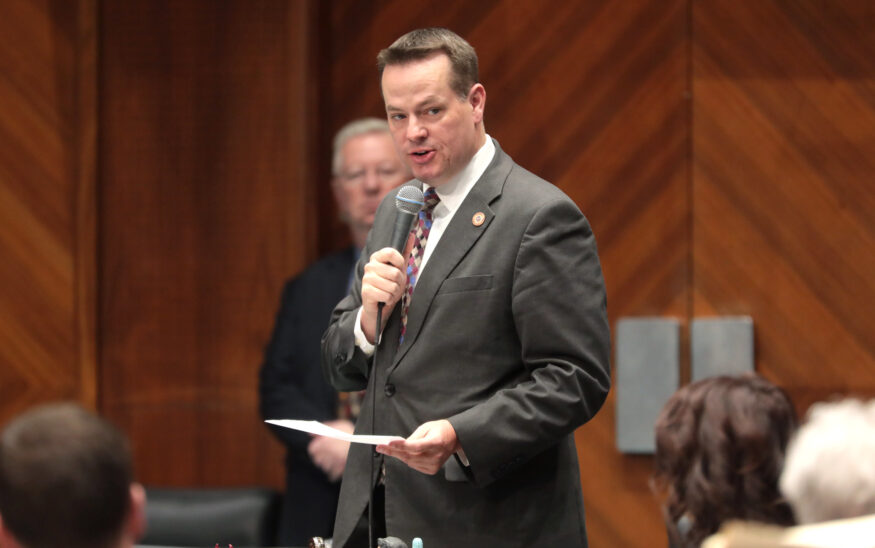Does Arizona still have a part-time Legislature?
Jakob Thorington Arizona Capitol Times//August 16, 2025//
Does Arizona still have a part-time Legislature?
Jakob Thorington Arizona Capitol Times//August 16, 2025//
Key points:
-
Lawmaker proposes constitutional requirement to end legislative session in 100 days
-
Last time the legislative session wrapped up before June was April 2015
-
Low salary and longer sessions keep people from seeking public office
Both chambers of the Arizona Legislature have traditionally pushed to finish the legislative session by its 100th day, but that goal hasn’t been met in a decade.
Now, one lawmaker wants to enshrine it as a requirement in the state Constitution.
Rep. Justin Wilmeth, R-Phoenix, plans on introducing a concurrent resolution next session that would require lawmakers to be done with the legislative session by the end of April.
“I want it to be in the Constitution that we have to be done,” Wilmeth said. “I think most people are going to like it. Some won’t, but that’s the conversation I am making us have next year.”
Lawmakers didn’t sine die, or adjourn for the session, until June 27, the 213th day of the session this year.
The last time lawmakers wrapped up their business in April was 2015, which had a sine die date of April 3. That 81-day session was unusual even a decade ago, as it was the shortest legislative session seen in close to a half century.
Wilmeth was first elected to the Arizona House in 2020, and each session he has been involved in has gone at least into June. In 2023, lawmakers didn’t adjourn for the year until July 31 — more than two months after Gov. Katie Hobbs signed that year’s budget. The four sessions from 2016-2020 finished in May following 2015’s unusually short session.
“It’s important for us to stay true to what we’re supposed to be. We’re either going to be a part-time Legislature that gets done in four months … or we need to have a conversation about considering a full-time Legislature,” Wilmeth said. “I’m not saying we should do that, but what we’re doing now is akin to being a sprint runner and then having it morph into a marathon halfway through the race.”
Longer sessions mean more difficulty for legislators without a passive income, as time spent on the chamber floor often equates to lost time for personal careers or businesses. And while Wilmeth has set his sights on limiting the duration of session, several others have introduced proposals to tackle the complications of a $24,000 annual salary.
Last session, Sen. John Kavanagh, R-Fountain Hills, introduced Senate Concurrent Resolution 1003, which would have adjusted lawmakers’ annual salary, which voters approved in 1998, to inflation. The measure never got a hearing on the House floor, but it did clear the Senate and the House Appropriations Committee.
If Kavanagh’s measure was in effect, the salary for lawmakers would nearly double to just under $48,000. Kavanagh argued during discussions of the bill that he doesn’t believe it was the intent of 1998 voters for lawmakers to only be paid roughly $12,000, which is about how much $24,000 in 2025 would be worth back then.
Kavanagh, who was recently named the new Senate majority leader, told the Arizona Capitol Times he plans on reintroducing the measure next session.
The average annual salary for state lawmakers across the country in 2024 was $44,320, according to the National Conference of State Legislatures.
The low salary has become an issue for some lawmakers. Former Democratic Sen. Eva Burch resigned in March and cited the salary as one of the reasons for her departure from the Capitol.
“I have been struggling to make ends meet and to find balance with my legislative work and my job as a healthcare provider. I know that I am not the first, nor will I be the last, good person to find themself a casualty of legislative pay,” Burch said in a statement about her resignation. “I hope that the future will see Arizona lawmakers earning a living wage so that our constituents can be represented by working class citizens who understand the pressures of raising a family and struggling to make ends meet here in Arizona.”
That’s one of the reasons why Wilmeth is advocating for a constitutionally required shorter session. He said the length of recent legislative sessions combined with the salary is keeping people from running for office.
“Four months is easy to sell to maybe your wife or husband or your employer, but six months is a problem,” he said.
Both Wilmeth’s measure and any measure related to legislative pay would have to be approved by Arizona voters in a general election if they make it through the House and Senate. Rep. Stacey Travers, D-Tempe, said she doesn’t think voters would be willing to increase her and her colleagues’ salaries.
“I don’t know if we deserve a raise with the way we’ve been behaving as a Legislature,” Travers said.
Travers has introduced her own proposal for raising legislative salaries, but it does come with “strings.” Her 2024 concurrent resolution proposed increasing salaries to $35,000 annually, which would then be adjusted every two years based on the percentage change of the consumer price index.
Her resolution also called for lifetime term limits, which would only allow lawmakers to switch chambers once. Currently, a legislator can serve in one chamber for a maximum of four consecutive two-year terms.
“If it comes tied with strings, then it’s something I think is worth a conversation,” Travers said.
Kevin DeMenna, a senior adviser at DeMenna Public Affairs, has been one of the most vocal advocates for increasing legislative salaries.
In a 2022 opinion column published by The Arizona Republic, DeMenna proposed raising the salary upward in the range of $70,000, since the part-time position requires attention from lawmakers all year.
DeMenna’s idea is close to proposals from other lawmakers about legislative pay. Rep. Chris Mathis, D-Tucson had a measure that would set legislative salaries equal to salaries of county supervisors, who make between $83,000 to $96,000 depending on the county’s size. Sen. Catherine Miranda, D-Laveen, also had a measure that would raise lawmakers’ salaries to $70,000.













































